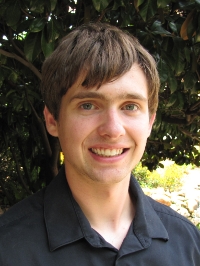2017 SRE Program Participant Profiles: Brian Lerch
 |
Hometown: Dayton, OH |
What is the purpose of your research?
We are studying the evolution of mating systems in territorial, migratory songbirds. That is, we are trying to figure out why some birds pair with only a single mate in a given breeding system, whereas other birds have a number of mates. Specifically, we're trying to understand how different spatial effects lead to a variety of mating systems, focusing primarily on female mate choice. Further, we would like to understand the evolution of female mating strategies with regards to their mate choice.
![]()
Here at NIMBioS, I've worked with people from a broad spectrum of backgrounds, from applied mathematicians to experimental biologists. Learning how to work with such a variety of people is definitely a skill I've improved on.
![]()
– Brian Lerch, SRE participant
What does the research ultimately accomplish?
This research (and really all of my research experience) regards topics that are quite theoretical and not all that practical. No one is going to build technology or improve humanity based off of the mating systems of birds. The purpose of this research is really to expand human knowledge and to better understand the natural world. A potential application of work like this would be the ability to make better-informed conservation decisions. The more information available to wildlife managers about the species they are trying to protect, the better they will be able to protect these species.
Personally, I enjoy conducting research that is theoretical in nature. Such work tends to provide more general insight into the way the natural world works. It's very exciting for me to just try to understand all of the intricacies and complexity found in nature, even if there is no application to this understanding.
What were your favorite parts of the SRE program?
I love devising and analyzing models. I really enjoy simplifying the natural world by using math and seeing what insights the new, stripped-down reality can provide. As such, I'd have to say I had the most fun coming up with the plan for our model with my group and then coding it up. More broadly, it was great being so close to the Smoky Mountains. Pretty much every weekend I was at the national park going for a hike up a mountain or finding some other scenic view. Knoxville is a great location to spend the summer.
What new experiences did you gain that have helped you today?
Previously, all of my research was with theoretical ecologists—by that I mean everyone I was around had a pretty similar background. Here at NIMBioS, I've worked with people from a broad spectrum of backgrounds, from applied mathematicians to experimental biologists. Learning how to work with such a variety of people is definitely a skill I've improved on. I've been able to learn from these different backgrounds and hopefully they've been able to learn from mine.
What advice would you give someone who's interested in/curious about participating in the program?
Apply. It can't hurt to get your name out there and give it a shot. It'd also be a good idea to read all that you can about the different projects that you're interested in to better understand what you'd be doing at NIMBioS. This program is a great way to determine areas of research you might like to pursue in the future, so don't shy away just because you aren't 100% sure you have a future in the field.
What do you do outside of work?
I'm a pretty big sports fan, especially when it comes to football and hockey. I've played hockey since I was five. If I'm not watching or playing sports, I like to be outside. I'm a pretty avid hiker and also enjoy kayaking. Some of the best hikes of my life have come in the Smoky Mountains this summer.
Where do you see yourself in 10 years?
I hope to make a career out of academic research, so I still have a long path ahead to get to where I'd like to end up. In ten years, I expect to have earned a PhD and be working on/ finished with a postdoc. If I'm very fortunate I might have a faculty position at a research university. If not, I expect that I'll be searching for such a position.
Related Links
Main SRE page
2017 Summer Program
NIMBioS
1122 Volunteer Blvd., Suite 106
University of Tennessee
Knoxville,
TN 37996-3410
PH: (865) 974-9334
FAX: (865) 974-9461
Contact NIMBioS


